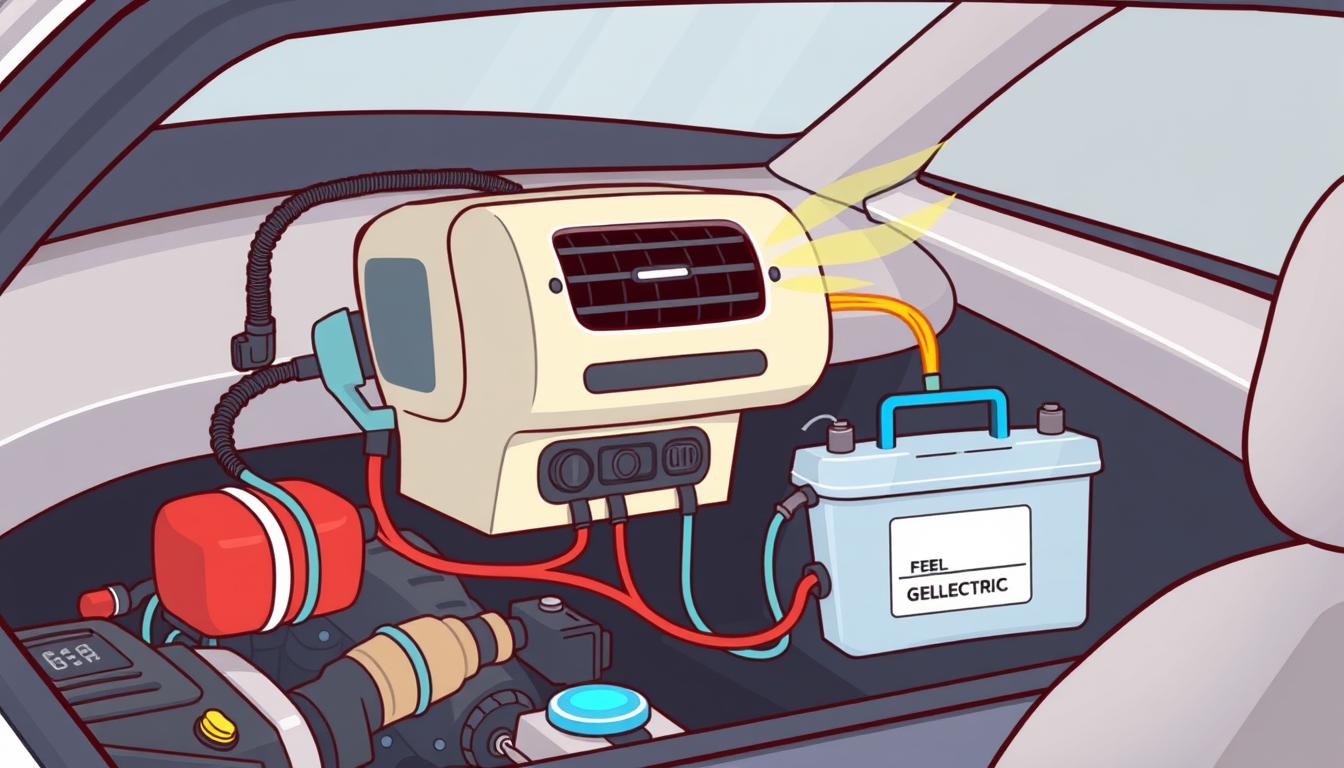As summer heats up, car owners wonder if their AC uses fuel or battery. This article will dive into how car AC systems work. It will look at the compressor and refrigerant’s role and if they use the engine’s fuel or the battery. Knowing this can help car owners make better choices for cooling and efficiency.
Contents
Key Takeaways
- Car AC systems can be powered by the engine’s fuel or the vehicle’s battery, depending on the design and technology.
- The compressor and refrigerant play a crucial role in the car’s AC system, working together to cool the air.
- Understanding the power source of your car’s AC system can help optimize its efficiency and impact on fuel consumption.
- Electric vehicles and hybrid cars offer alternative cooling solutions that may not rely on the engine’s fuel.
- Regular maintenance and servicing of the AC system are important to ensure optimal performance and longevity.
Understanding the Basics of Car Air Conditioning
The car’s air conditioning (AC) system is key for a comfy drive, especially when it’s hot. But have you ever wondered how it works? Let’s explore the basics of a car’s AC system and see how the compressor and refrigerant play a part.
How Does a Car AC System Work?
A car’s AC system uses a refrigerant in a closed loop. It has several important parts:
- The compressor, which makes the refrigerant hot by pressurizing it.
- The condenser, where the hot refrigerant loses heat and turns into a liquid.
- The expansion valve, which cools the liquid refrigerant, making it a cold gas.
- The evaporator coil, where the cold gas takes heat from the car’s air, cooling it down.
This process keeps happening, with the compressor moving the refrigerant around to keep the car cool.
The Role of the Compressor and Refrigerant
The compressor is vital, pressurizing the refrigerant and keeping the AC running. It’s connected to the engine by a belt, so it moves with the engine.
The refrigerant is what makes the AC work, moving heat out of the car. Over time, refrigerants have changed, with R-1234yf being the latest, more eco-friendly option. Keeping the refrigerant in check is key for the AC to work well and safely.
The Power Source: Does Car AC Use Fuel or Battery?
A car’s air conditioning can get its power from the engine or the battery. In traditional cars, the AC compressor is powered by the engine. This means the AC uses the engine’s fuel to work, as the engine must run for the compressor to work.
Engine-Driven AC Compressor
A car’s AC uses about 1/4 HP on a normal day at a low setting. But on hot or humid days, it can use around 10 HP with the fan at full speed. This high power use can affect the engine’s fuel efficiency.
Battery-Powered AC Fans
In hybrid and electric cars, the AC is powered by the battery. These cars use fans powered by the battery to cool the cabin. The AC’s power use in these cars depends on the model and year, but it’s usually lower than in engine-powered cars.
Modern cars have a relay to save power by turning off the AC when speeding up. Keeping windows closed and turning off extra accessories can also save power and fuel.
“Opting to keep windows open without using the AC can create a less humid interior and potentially save fuel.”
does car ac use fuel or battery
A car’s air conditioning (AC) system can get power from the engine’s fuel or the battery, based on the car type. In traditional cars, the AC compressor is powered by the engine. This means the AC uses the engine’s fuel to work, since the engine must run for the compressor to work.
In hybrid and electric cars, the AC might use the battery instead. For instance, the 6th generation Honda CR-V has an electric AC compressor powered by a high-voltage hybrid battery. This lets the AC work even when the engine is off. This setup is more efficient than traditional AC systems.
| Vehicle Type | AC Power Source |
|---|---|
| Gasoline/Diesel-Powered | Engine-driven Compressor |
| Hybrid | Battery-powered Electric Compressor |
| Electric | Battery-powered Electric Compressor |
Battery-powered AC systems have their benefits, but they might not be as efficient as heat pumps. Heat pumps can cool and heat, but they’re less common in hybrid cars because they’re expensive.

The AC system’s power source affects fuel efficiency. Using the AC can increase fuel use by up to 10% in newer cars. Older cars might see bigger drops in efficiency. Factors like driving speed, window use, and the car’s design also play a role.
Fuel Efficiency and Air Conditioning Usage
Impact on Gas Mileage
Using a car’s air conditioning (AC) affects its fuel efficiency and gas mileage. The AC adds a load on the engine, making it use more fuel. This means the car’s fuel economy drops, especially in city driving or traffic.
Studies show air conditioning can cut fuel efficiency by up to 20% under certain conditions. SUVs are hit harder, losing up to 8% efficiency at 55 mph with windows down. But driving with windows down below 55 mph is better than using the AC.
To keep car AC fuel consumption and AC impact on vehicle MPG low, turn on the AC at 55 mph or more with windows up. Also, use energy efficiency of car AC tips like gradual braking and proper tire care. Avoid idling and drive in a higher gear to help.
For electric vehicles (EVs), air conditioning uses more electricity and can drain the battery faster. Pre-cooling the car plugged into a charger and setting the AC to a warmer temperature helps. This extends the range of plug-in hybrids and EVs.
“Running a car’s air conditioning is the main contributor to reduced fuel economy in hot weather.”
Knowing how air conditioning affects car AC fuel consumption, AC impact on vehicle MPG, and energy efficiency of car AC helps drivers. They can make better choices to save fuel and reduce their environmental impact while staying cool.
Maintaining Your Car’s AC System
Keeping your car’s air conditioning (AC) system in good shape is key for its long-term performance and efficiency. Regular checks and recharging the refrigerant are essential. This helps your vehicle’s AC work better.
Regular Servicing and Refrigerant Checks
It’s a good idea to have a pro check your car’s AC every 12 to 24 months. This service includes:
- Inspecting the system for any leaks or damage
- Checking the refrigerant level and recharging it if necessary
- Cleaning the condenser and other components
- Ensuring the system is operating at the correct pressure
Checking and keeping the refrigerant level right is very important. This coolant makes the system cool the air inside your car. If the level is low, the system works harder. This can make it less efficient and cause damage over time.

“Well-maintained air conditioning systems run more efficiently, reducing their impact on the engine and fuel consumption.”
By keeping up with AC maintenance, you’ll enjoy a cooler ride. You’ll also save on fuel and make the AC last longer.
Alternative Cooling Solutions for Electric Vehicles
The popularity of electric vehicles (EVs) is growing fast. This means we need better and greener cooling solutions. EVs don’t have a traditional engine, so their air conditioning can’t run off the engine’s power. But, car makers are finding new ways to keep EVs cool.
Heat pump systems are one solution that’s more energy-efficient than old-school heating and cooling. They take heat from outside air to warm the car, using less battery power. But, these systems don’t work as well in very cold weather, cutting down the EV’s range.
Using advanced insulation materials is another way to keep EVs cool. Stuff like EPP foamed polypropylene is great for keeping heat out and protecting against impacts. It’s used in seats, headrests, and around the battery, helping to keep the car at a good temperature. This also means the car uses less energy to stay cool.
Source Links
- https://forum.level1techs.com/t/air-conditioning-and-solar-and-the-mojave-desert/197435 – Air Conditioning and Solar and the Mojave Desert
- https://www.grafphoto.com/2021/05/24/some-practical-thoughts-on-driving-electric/ – Some Practical Thoughts on Driving Electric | Notes from the Woods – Thoughts
- https://batteryuniversity.com/article/bu-403-charging-lead-acid – BU-403: Charging Lead Acid
- https://www.firestonecompleteautocare.com/blog/maintenance/everything-you-need-to-know-about-your-cars-ac/ – What You Need to Know About How a Car A/C Works
- https://www.autocareplus.com/blog/podcast/your-cars-air-conditioning-everything-you-need-to-know-plus-way-more/ – Your Car’s Air Conditioning, Everything You Need to Know Plus Way More! – Auto Care Plus
- https://www.endesa.com/en/blogs/endesa-s-blog/air-conditioning/heating-air-conditioning-car – How much petrol does your car’s heating and air conditioning use?
- https://carfromjapan.com/article/car-maintenance/how-much-power-car-ac-draws/ – How Much Power Car AC Draws? The Facts
- https://www.solterraforum.com/threads/using-ac-when-parked.1516/ – Using AC when parked
- https://www.crvownersclub.com/threads/air-conditioning-and-gas-engine-in-hybrid.236024/ – Air Conditioning and Gas Engine in Hybrid
- https://www.jurnileasing.co.uk/blog/windows-down-or-air-con-on-which-is-more-efficient – What Uses More Fuel: AC On or Windows Down? | Jurni
- https://www.audistratham.com/does-car-ac-use-gas.htm – Does Car AC Use Gas? | Car Buying Tips
- https://www.fueleconomy.gov/feg/hotweather.shtml – Fuel Economy in Hot Weather
- https://www.firestonecompleteautocare.com/blog/maintenance/does-ac-use-gas/ – Does Running The Air Conditioner Use More Gas?
- https://myjackfrost.com.au/car-air-conditioning/do-cars-use-more-fuel-with-the-ac-on/ – Do Cars Use More Fuel With the AC On?
- https://knaufautomotive.com/air-conditioning-in-an-ev/ – How does air conditioning and heating work in an EV? | Knauf Automotive
- https://www.faistgroup.com/news/electric-vehicles-thermal-cooling-systems/ – Electric vehicles thermal cooling systems
- https://bonair.co.uk/understanding-the-differences-air-conditioning-in-electric-and-petrol-cars/ – The Differences of Air Conditioning in Electric and Petrol Cars

Hi, I’m Sufiyan, the developer behind this platform. I created FuelConsumptionCalculator.com to simplify fuel tracking for everyone — because understanding your vehicle shouldn’t require a degree in mechanics. I’m always working on adding more tools and content to make this site even more useful

